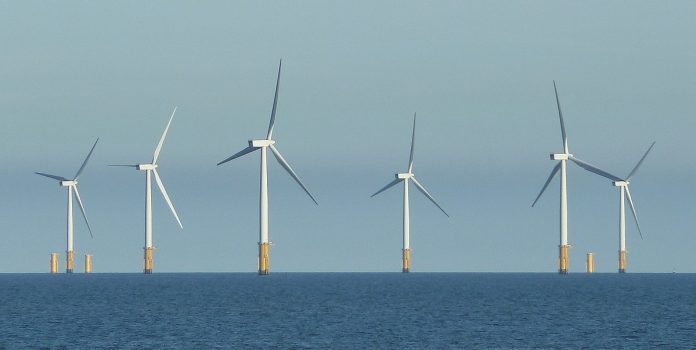The administration of President Joe Biden announced final approval for the Vineyard Wind project, which plans to install up to 84 giant turbines about 12 nautical miles off the coast of Martha’s Vineyard, Massachusetts.
The 800-megawatt project is the down payment on Biden’s goal of installing 30,000 MW of offshore wind energy by the year 2030.
“The approval of this project is an important step toward advancing the [Biden] administration’s goals to create good-paying union jobs, while combating climate change and powering our nation,” said, Deb Haaland, the U.S. Secretary of the Interior, in a statement.
Fishing Industry Displeased
Responsible Offshore Development Alliance (RODA), a coalition of fishing industry associations and fishing companies, condemned the project’s approval, stating government officials “met with silence” their legitimate concerns about the project’s impacts on fish stocks and vessel traffic.
The fishing operators in the region claim the one-time $16 million payout offered to them to offset any loses and the promise to “study” the effect of the Vineyard Wind project on fisheries are too little, too late.
RODA notes one study found “the Bureau of Ocean Energy Management significantly underestimated the intensity of the fishing effort taking place in the Vineyard Wind project area and seriously undervalued the fisheries, especially the squid fishery.”
“Safe transit for mariners through wind energy areas is a key issue for fishermen with regard to offshore wind development in the U.S.,” says RODA’s summary on its website. “Currently, the regulatory process does not require any specific project design conditions to allow fishermen to safely transit through wind energy areas on the way from ports to traditional fishing grounds. “This is a critical shortcoming in the federal planning and review process,” said RODA. “RODA is striving to address this issue and ensure our fishing fleets’ safety at sea.”
Army Corps Lists Harms
In the U.S. Army Corps of Engineers (Army Corps) portion of the Federal Record of Decision (ROD) it indicated the Vineyard Wind project would likely be bad news for fisheries.
“While Vineyard Wind will have beneficial impacts to the local economy, it is anticipated that there will be negative economic impacts to commercial fisheries,” wrote the Army Corps. “[D]ue to the placement of the turbines it is likely that the entire 75,614-acre area will be abandoned by commercial fisheries due to difficulties with navigation.
“It is anticipated that the discharge of fill material associated with the project will result in major impacts to mollusks, fish, and crustaceans in the project area,” continued the Army Corps’ analysis.
The Army Corps estimated the dumped fill material will smother any mollusk species nearby and have 36 adverse effects on fish eggs and the larval stages of some crustaceans.
Benefitting Foreign Corporations
The Vineyard Wind Project will primarily benefit foreign corporations who stand to receive billions of dollars in federal in loan guarantees and renewable energy credit subsidies, says author and energy analyst Robert Bryce.
“Britain’s BP, Norway’s Equinor, and Denmark’s Ørsted are developing a total of some 6.2 gigawatts of offshore wind capacity in U.S. waters,” said Bryce. “Those companies aren’t coming to America for the cheeseburgers, they’re coming here hoping to collect billions of dollars in federal tax credits.”
In addition, Vineyard Wind is likely to harm sea life in the area, says Bryce.
“Some of the permitted wind projects sit directly atop some of the best squid and scallop fisheries on the Eastern Seaboard,” Bryce said. “Rockefeller University energy expert Jesse Ausubel called the push for a huge expansion of offshore wind a “massive industrialization” that will negatively impact ocean life.
“Putting thousands of offshore platforms off our coast will have impacts on fisheries, navigation, and national security.” Bryce said.
Based on past experience the Biden administration’s huge wind farm expansion plans are more likely wishful thinking than a goal that will actually be achieved, says Bryce
“In a 2011 speech by then-Interior Secretary Ken Salazar at a conference sponsored by the American Wind Energy Association, Salazar boasted of the Obama Administration’s ‘ambitious – but achievable’ goal of deploying 10 gigawatts of offshore generating capacity by 2020 and 54 gigawatts by 2030,” Bryce said. “How did that worked, you might ask; well, ten years after Salazar’s speech, the United States has five offshore wind turbines producing a total of capacity of 30 megawatts of electric power — some 9,970 megawatts short of the ambitious but supposedly achievable goal laid out in 2011.”
Wind Won’t Reduce CO2
Multiple studies by independent experts have found offshore wind energy is a net economic and environmental loser, Physicist John Droz, Jr. director of the Alliance for Wise Energy Decisions.
“Four different consultants hired by New Jersey officials between 2008 and 2012 all found offshore wind was a loser,” Droz said. “Wind energy is not a winning solution to climate change, either.
“No scientific study done anywhere has concluded expanding wind energy will prevent a consequential amount of carbon dioxide from entering the atmosphere,” said Droz. “The reason is there is no such thing as wind energy by itself – it is inescapable that wind energy must be paired with an augmenting source of energy, which in 95 percent of cases is natural gas, because it’s the only conventional energy source that can ramp up and down as quickly as wind and thus be able to provide energy when the wind turbines are not.”
Duggan Flanakin (dflanakin@gmail.com) writes from Austin, Texas.



























[…] under heightened scrutiny from groups concerned about sea life and traditional ocean activities.Commercial fishing groups have organized to oppose a huge offshore wind project 12 nautical miles off the coast of […]